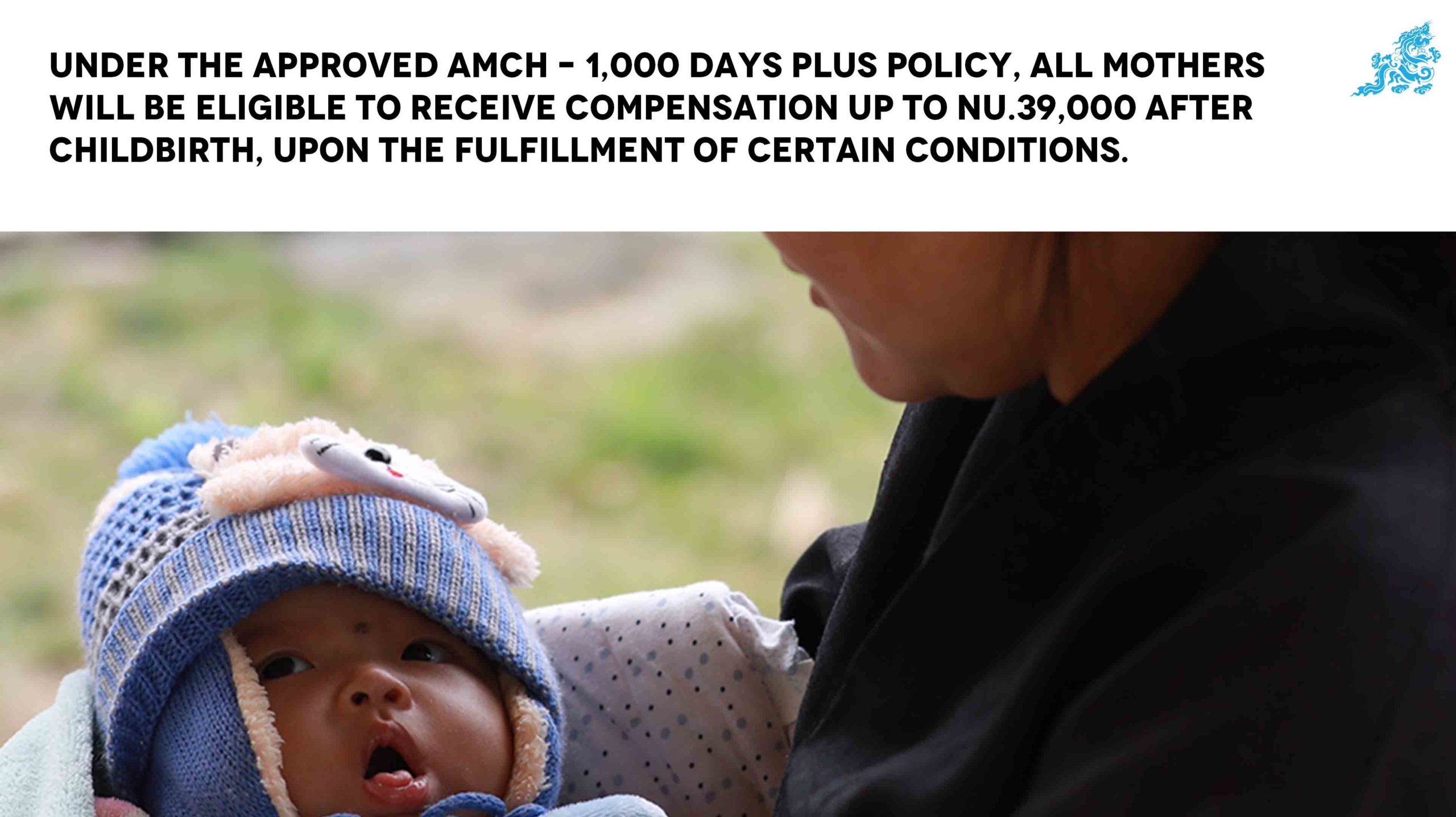AMCH – 1,000 Days Plus Policy to pay Nu 39,000 will start within this year
Younten Tshedup
All eligible mothers will receive Nu 39,000 each from the day of conception until the child attends the age of two years, under the approved policy to accelerate mother and child health outcome (AMCH) – 1,000 Days Plus.
The policy was approved towards the end of last year after it was submitted to the Gross National Happiness Commission for review.
Under the policy, the health ministry through a conditional cash transfer (CCT) programme would make the payments to all eligible mothers in tranches upon the fulfillment of certain conditions.
The conditions include completing the recommended eight ante-natal care (ANC) and four post-natal care (ANC) visits, institutional delivery of the child, exclusive breastfeeding for six months, and getting the child immunized, among others.
Officials from the ministry said that between the first day of conception until 12 weeks, a pregnant mother should register with a health care centre. At the end of the 12th week, the first tranche of payment amounting to Nu 1,000 would be released to the mother.
Pregnant mothers would require a minimum of 25 visits to the heath care centres. The money would be disbursed in 21 tranches. Nu 1,000 would be released in each tranche during the first eight ANC visits. Following the delivery of the baby, until he or she completes six months, the mother would receive Nu 4,000 for each visit.
Officials said that both the mother and child needed extra care during this period — after delivery until the child is six months — which is why the amount was kept higher.
From six months until the child turns two, the regular amount of Nu 1,000 would be disbursed. Officials said that although the amount was initially based on the national minimum wage rate, the ministry increased it to Nu 39,000 from Nu 22,500.
Mothers with paid maternity leave excluded
Pregnant mothers who receive paid maternity leave of six months are ineligible for the monetary incentive. For those who get less than six months maternity leave, the payment would be made proportionately.
According to the approved AMCH – 1,000 Days Plus Policy, the primary objective of the policy is to accelerate the achievement of mother and child health outcomes by increasing the uptake of Mother and Child Health (MCH) services through a holistic and comprehensive approach.
The policy is expected to ensure the availability and accessibility of quality MCH services and also financially empower women by enabling them to operate their own personal savings bank account.
In line with the government’s vision to narrow the gap between the haves and have-nots, the breastfeeding allowance to pregnant mothers was one of the popular pledges.
The AMCH – 1,000 Days Plus Policy, which was also once called maternity allowance, was to be rolled out in August 2019, but owing to budget and resources constraints, the programme was delayed.
The programme was then pushed for March 2020 but following several studies, a need for a policy was recognised.
Health officials said that maternal health services in the country were under-utilised during pregnancy, delivery, and post-natal period, contributing to high maternal and neonatal mortalities. Maternal Mortality Ratio (MMR) in Bhutan is estimated at 89 per 100,000 live births, according to the Population and Housing Census 2017.
The national nutrition survey (NNS) 2015 showed that only 25.9 percent of the pregnant women reported completing the recommended eight ANC visits. Also, about half the pregnant women in Bhutan did not come to register their pregnancies until after the first trimester — which resulted in women missing out some critical services in the early phase of their pregnancies.
The PNC coverage was also recorded at 77.7 percent, and the coverage of the four recommended PNC visits was below optimum level.
However, owing to budget constraints the commencement date has not been set yet.
Sowai Lyonpo (health minister) Dechen Wangmo in an earlier interview said that due to the Covid-19 pandemic and given the current economic situation, the programme could not take off immediately.
With the approval of the policy, Lyonpo said that programme would be launched within this year.
She added that the approval of policy was a major milestone for mother and children and that it would narrow the gap between rural and urban mothers in terms of mother and child health services.
“This is personally one of my topmost priorities to implement, and I’ve worked hard with extreme passion to make sure this comes through,” Lyonpo said. “People must understand that investing money for a child is not an expenditure when children are considered as our future that will build a stronger nation.”


